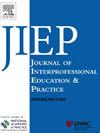Patient and staff perceptions of transdisciplinary stroke assessment: Insights into experience, team trust, and confidence in each other from a mixed method study
Q3 Social Sciences
Journal of Interprofessional Education and Practice
Pub Date : 2025-09-23
DOI:10.1016/j.xjep.2025.100767
引用次数: 0
Abstract
Transdisciplinary models of care combine clinical knowledge and skills from multiple disciplines and can help healthcare teams reorganise and optimise service delivery. However, there are many factors that could impact the success of transdisciplinary initiatives. The aim of the study was to understand factors impacting the implementation of a transdisciplinary stroke assessment by allied health professionals. A mixed-method exploratory design was used. Surveys, focus groups and individual interviews were completed at multiple time points. Data analysis was completed in two stages. First, key survey results were descriptively summarised for presentation in focus groups and interviews. Second, inductive content analysis was completed with NVivo 12 Plus software. Patient experience with the assessment was related to repetition, length, and thoroughness. Staff were satisfied with using the transdisciplinary assessment due to workload-sharing benefits. The main reasons for team trust were the consistency of assessment administration and results (i.e., trust in each other), perceived benefits of the transdisciplinary assessment (i.e., trust in the assessment), and facilitators such as prospective conversations about trust. Staff confidence in their own and other's ability to safely and effectively use the transdisciplinary assessment was linked to competence and supported by training, observation of colleagues, and familiarity with assessment tasks. The study provides important insights that could inform the planning and implementation of future transdisciplinary approaches in healthcare settings.
病人和工作人员对跨学科中风评估的看法:从混合方法研究中了解经验,团队信任和彼此的信心
跨学科护理模式结合了来自多个学科的临床知识和技能,可以帮助医疗团队重组和优化服务提供。然而,有许多因素可能会影响跨学科计划的成功。本研究的目的是了解影响联合卫生专业人员实施跨学科卒中评估的因素。采用混合方法探索性设计。调查、焦点小组和个人访谈在多个时间点完成。数据分析分两个阶段完成。首先,对主要调查结果进行描述性总结,以便在焦点小组和访谈中介绍。其次,利用NVivo 12 Plus软件完成归纳性内容分析。患者对评估的经验与重复、长度和彻底性有关。由于工作量分担的好处,员工对使用跨学科评估感到满意。团队信任的主要原因是评估管理和结果的一致性(即相互信任),跨学科评估的感知利益(即对评估的信任),以及诸如关于信任的前瞻性对话之类的促进因素。员工对自己和他人安全有效地使用跨学科评估能力的信心与能力有关,并得到培训、同事观察和对评估任务的熟悉程度的支持。该研究提供了重要的见解,可以告知计划和实施未来的跨学科方法在医疗保健设置。
本文章由计算机程序翻译,如有差异,请以英文原文为准。
求助全文
约1分钟内获得全文
求助全文
来源期刊

Journal of Interprofessional Education and Practice
Social Sciences-Education
CiteScore
1.60
自引率
0.00%
发文量
80
期刊介绍:
Journal of Interprofessional Education & Practice, a quarterly online-only journal, provides innovative ideas for interprofessional educators and practitioners through peer-reviewed articles and reports. Each issue examines current issues and trends in interprofessional healthcare topics, offering progressive solutions to the challenges facing the profession. The Journal of Interprofessional Education & Practice (JIEP) is affiliated with University of Nebraska Medical Center and the official journal of National Academies of Practice (NAP) and supports its mission to serve the public and the health profession by advancing education, policy, practice & research.
 求助内容:
求助内容: 应助结果提醒方式:
应助结果提醒方式:


